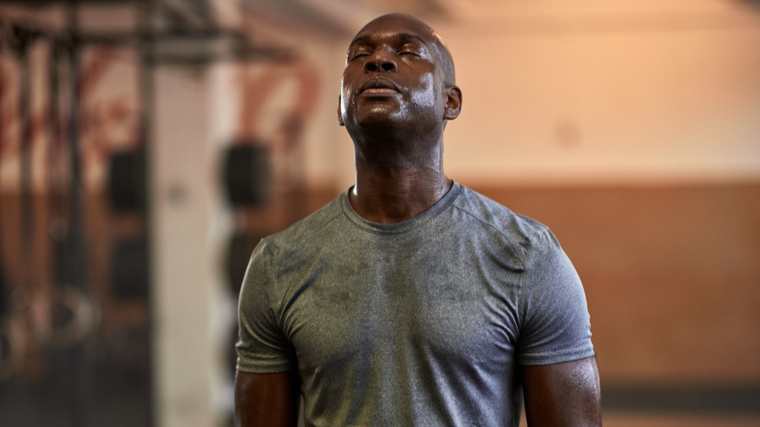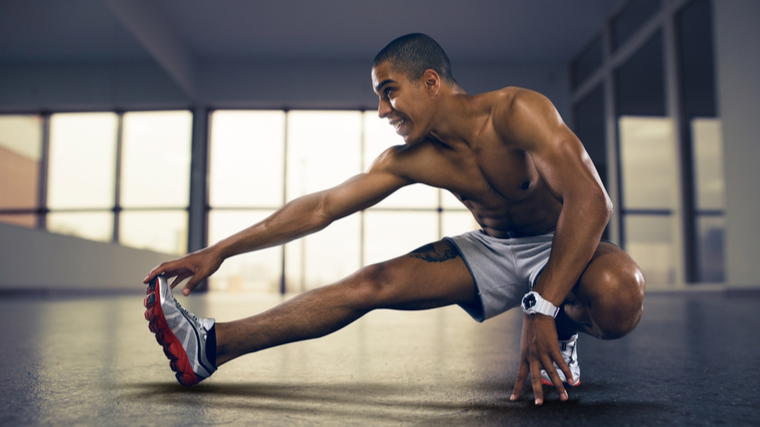You dream about lifting heavy and being on the platform is the best part of your day. All your friends know that your gym time is sacred, and you can barely take a proper rest day without itching for iron. Strength training is where many lifters turn to improve both mental and physical health. But lifting day in and day out also puts extra stress on your muscles, joints, and nervous system.
If your body is overworked, you put yourself at a higher risk of overtraining. When you train too much, you’re actually jeopardizing your gains. Instead, you’ll give yourself more fatigue and general exhaustion, along with potential mood changes, muscle strains or injuries, and some serious lifting plateaus.

In the ever-lasting pursuit of more strength, approximately 30 percent of athletes experience some form of overtraining at least once in their careers. (1)To protect yourself from the effects of training too much, it’s vital that you take time to rest and recover. Enter the deload week.
What is a Deload Week?
A deload week is a break in your regular training regimen aimed at improving your recovery. It’s typically scheduled out in advance and repeated roughly every four to eight weeks. The break could mean lightening your workload that week or completely avoiding the gym.
With so many influencers or athletes telling you to be in the gym every day or to never miss a Monday, it gets hard to know how often you should actually train. Regardless of how much you typically train day-to-day, if you’re training hard over the course of your program, you’ll want to take a deload week.

The purpose of a deload week is to allow your body to recover fully and to help prevent overtraining. Taking it easy helps your muscles and joints recover and get stronger while giving your body and mind some time to relax.
Benefits of Deloads
Just how your body needs exercise, it needs consistent breaks, too. A deload week could be exactly what you need.
Improved Heart Health
One of the symptoms of overtraining can be a change in your heart rate variability (HRV) — that’s the time interval between your heartbeats. Changes in your HRV can be associated with diabetes, cardiovascular disease, and psychological disorders. (2)
In general, the higher your HRV, the better. But overtraining can decrease your HRV. Scheduling a deload week consistently can help prevent symptoms of overtraining from occurring — including a reduced HRV. Taking one deload week for every five weeks of training can be beneficial for HRV. (3)
Stronger Bones
You might think of your muscles wearing down and building back up when you train hard. But lifting also puts a lot of stress on your bones and joints. In general, that’s a good thing. Strength training is largely beneficial for your bone health — kind of like your muscles, putting your bones under careful pressure with heavy weights ultimately makes them stronger. But, taken to an extreme without enough rest, your bones won’t have enough time to come back stronger.
This lack of recovery can lead to pain, limited range of motion, or injury. Reducing your training load periodically can have a positive effect on bone health because it can reduce the amount of sclerostin production, which is a protein that stops bone formation. (4)
Boosts Muscle Hypertrophy
You may have heard the saying that muscle is built outside of the gym. Although you’re training your muscles inside the gym, nutrition and recovery aimed at muscle growth help rebuild your tissues. That’s what stimulates hypertrophy.

[Read More: Powerbuilding Workout Routine, With Tips from a CPT]
If you’re a bodybuilder or someone who’s training for muscle growth, chances are you’re training hard and heavy. But not allowing your muscles to recover is counterintuitive to your progress. Planning ahead for a deload week can produce similar gains in muscle and strength as a spontaneous deload — but scheduling one helps you recover at a faster rate. (5)
Bust Through Plateaus
Progressive overload means adding weight, volume, or frequency to your routine to continually gain strength and muscle. However, if you’re constantly fatigued, you may find yourself hitting a plateau.
Deload weeks are there to help you recover, but they’re also there to help you become stronger. Deload weeks have been shown to help increase strength and limit plateaus more than training with no deload period — which can make one more prone to plateaus. (6)
Psychological Benefits
Regular exercise can have a positive effect on mental health — sometimes, loving how working out makes you feel can be one of the reasons you don’t want to rest. But just like your skeletal muscles, your mind needs a break from the mental fatigue of lifting heavy weights.
Physical tasks like exercise may increase mental fatigue more than mental tasks, and not taking adequate rest can result in decreased motor control, motivation, and attention. (7) Giving yourself a week to destress your body and your mind may help improve your daily function and cognition that otherwise might be limited due to over-exercising.
Signs that You Need a Deload Week
It might seem contradictory to take time off of the gym to get bigger and stronger. But if you push your body too hard, it can actually limit your results or cause an injury. So how do you recognize the signs of needing a deload week?

You might need a deload week if you’re experiencing a lack of motivation, poor physical performance or inability to break through a plateau, prolonged pain or soreness, lack of sleep or appetite, or irritability. Ideally, you’ll plan a deload week ahead of time to prevent these symptoms before they even start.
How to Program a Deload Week
It’s important to take a deload week — or two, if you’re truly exhausted — when you’ve run your body down over the course of a long training program. But ideally, you want to avoid taking a deload week because you’re forced to.
You can always schedule a week of recovery before you’ve already pushed yourself too hard. Figuring out when to schedule it in your training routine will typically depend on how often and how intensely you’re training.
Choose When to Deload
If your body is already feeling pretty broken down from training, now is probably the time for a deload week. But if you’re feeling good and looking to the future, think about what kind of training is coming around the bend for you.

A higher frequency, volume, or intensity of training may require more frequent deload weeks. For competition-minded athletes, the intensity of your workout will likely be higher than the average gymgoer. Scheduling a deload week every four weeks of a 12-week training cycle can help prevent fatigue and overtraining, which can be beneficial especially before a competition. For context, powerlifter Jim Wendler suggests a deload once every four weeks in his famed 5/3/1 program.
For average gymgoers, you likely won’t need a deload week quite as frequently. Using that same 12-week cycle, you might opt for a deload week every eight weeks instead.
Choose What Kind of Deload to Take
Now, decide how you’re going to deload. You may still hit the gym but with lesser intensity, or you may not go to the gym at all. If you don’t plan on training at all, consider peppering your deload week with low-intensity activities like long walks and easy bike rides or hikes.
Still want to go to the gym during your deload week? Plan to reduce your working weight, exercise volume, or both. A weight deload means you lessen the amount of weight you would typically use in a training session. For example, if your regular training schedule calls for back squats, consider performing at 50 to 60 percent of your previous week’s heaviest set.
A volume deload means you lessen the amount of reps you would typically do. For example, you may typically perform four sets of a bench press. But on a deload week, you’ll cut it in half and perform two sets with the same amount of weight.
If it feels demoralizing to use such little weight and volume, think about greasing the groove of your lifts. Your entire body will appreciate the break, and you can improve your form without the crush of heavy loads on the bar. So you’ll come back with more physical strength and more technical perfection — with which you can lift even more.
Whether you’re in the gym or not, you might also consider using your deload week to emphasize recovery practices like mobility work, yoga, and meditation that you can also integrate into your regular routine.
Who Should Schedule a Deload Week
Anyone who exercises regularly could benefit from a deload week. But, this is an especially important tool for those who train hard with serious strength and muscle gains in mind.
Bodybuilders
The ultimate goal for bodybuilders is to build and develop their muscles for mass and aesthetics. This takes time, dedication, discipline, and recovery. To maximize muscle hypertrophy, you may need a higher training volume. (8)
Training with higher volumes can result in increased delayed-onset muscle soreness (DOMS) and may require longer periods of recovery. Scheduling regular deload weeks can help bodybuilders recover from intense soreness and help boost muscle growth.
Strength Athletes
Powerlifters, weightlifters, and strongwoman and strongman athletes focus on building strength, so you’ll typically find them lifting heavy weights for low reps. Constantly lifting heavy weights, no matter how low the reps, can result in physical fatigue or plateaus.

Hitting a strength plateau could be the difference between winning or losing a competition, so finding ways to bust through them is crucial. Because taking deload weeks can help reduce fatigue and injury risks while increasing performance longevity, these are especially critical for strength athletes. (9)
CrossFitters
If you’ve ever fought your way through a tough WOD, you know that CrossFit can be hard on your body. All of the explosive, higher-impact exercises can be great for your body and overall health, but there’s no denying that CrossFitters need recovery time. Taking a deload week a little bit before competition time can help your body come back rested and stronger.
Recreational Athletes
You don’t have to be preparing for a competition to take a deload week. The average gymgoer needs recovery just as much as competitive athletes do and can benefit from a deload week. Overtraining injuries can happen to anyone, regardless of their fitness experience. Taking time to rest can help avoid them.
Sample Deload Week
If you’re choosing to train with less weight during your deload week, your numbers can depend on your one rep-max (1RM) or on your heaviest set from the week before. Check out a sample deload week below to try for yourself. This sample is based on a three-day push/pull/legs routine.
Day 1:
- Triceps Extension: 3 x 10 @ 60% of last week’s heaviest weight
- Bench Press: 3 x 6 @ 60% of 1RM
- Overhead Press: 3 x 6 @ 60% of 1RM
Day 2:
- Lat Pulldown: 3 x 10 @ 60% of last week’s heaviest weight
- Bent-Over Row: 3 x 6 60% of last week’s heaviest weight
- Deadlift: 3 x 5 @ 50% 1RM
Day 3:
- Leg Press: 3 x 8 @ 50% of last week’s heaviest weight
- Romanian Deadlift: 3 x 6 @ 50% of last week’s heaviest weight
- Back Squat: 3 x 5 @ 50% of 1RM
Time to Unwind
With so much pressure from social media and other outlets to look or train a certain way, it can be difficult to remember that taking time to recover is just as important as exercising. Deload weeks will make you stronger in the long run while cultivating a holistic mindset and can prevent mental fatigue, too.
Don’t be afraid to miss that Monday — or the entire week — if that’s what your body and mind needs to bounce back better than before.
References
- Kreher, Jeffrey B., Schwartz, Jennifer B. Overtraining Syndrome: A Practical Guide. Sports Health. 2012; 4(2). doi: 10.1177/1941738111434406
- Young, Hayley A, Benton, David. Heart-rate variability: a biomarker to study the influence of nutrition on physiological and psychological health? Behavioural Pharmacology. 2018; 29(2). doi: 10.1097/FBP.0000000000000383
- Holmes, Clifton J, Wind, Stefanie A, Esco, Michael R. Heart Rate Variability Responses to an Undulating Resistance Training Program in Free-Living Conditions: A Case Study in a Collegiate Athlete. Sports. 2018; 6(4). https://doi.org/10.3390/sports6040121
- Kurgan, Nigel, Logan-Sprenger, Heather, Falk, Bareket. Bone and Inflammatory Responses to Training in Female Rowers over an Olympic Year. Medicine & Science in Sports & Exercise. 2018; 50(9). doi: 10.1249/MSS.0000000000001640
- Ogasawara, Riki, Yasuda, Tomohiro, & Ishii, Naokata. Comparison of muscle hypertrophy following 6-month of continuous and periodic strength training. European Journal of Applied Physiology. 2013; 113(4). doi: 10.1007/s00421-012-2511-9
- Herrick, Andrew B., Stone, William J. The Effects of Periodization Versus Progressive Resistance Exercise on Upper and Lower Body Strength in Women. The Journal of Strength and Conditioning Research. 1996; 10(2).
- Xu, Rui, Zhang, Chuncui, & He, Feng. How Physical Activities Affect Mental Fatigue Based on EEG Energy, Connectivity, and Complexity. Frontiers in Neurology. 2018. https://doi.org/10.3389/fneur.2018.00915
- Krzysztofik, Michal, Wilk, Michal, & Wojdala, Grzegorz. Maximizing Muscle Hypertrophy: A Systematic Review of Advanced Resistance Training Techniques and Methods. International Journal of Environmental Research and Public Health. 2019; 16(24) doi: 10.3390/ijerph16244897
- Androulakis-Korakakis, Patroklos, Michalopoulos, Nick, & Fisher, James P. The Minimum Effective Training Dose Required for 1RM Strength in Powerlifters. Frontiers in Sports and Active Living. 2021; https://doi.org/10.3389/fspor.2021.713655
Featured Image: Flamingo Images / Shutterstock